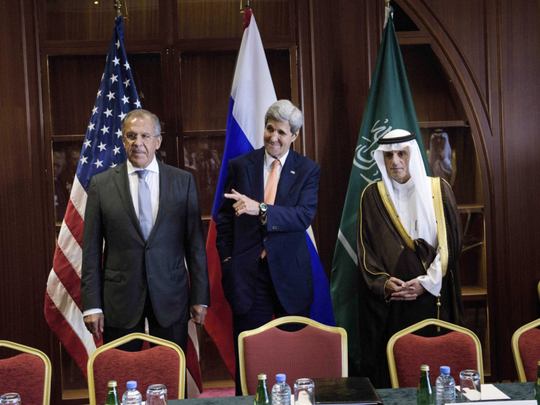
Dubai: Saudi and Russian foreign ministers, Adel Al Jubeir and Sergei Lavrov, will meet in Moscow today to discuss global energy markets and the Middle East crisis, including the war in Syria and the threat of Daesh.
Al Jubeir’s visit comes after reports in the Saudi press about the existence of backchannels between Riyadh and the Syrian regime to find an end to the conflict there. The two foreign ministers met a week ago in Doha and held three-party talks with US Secretary of State John Kerry amid intensified high-level diplomatic contacts over Syria and Daesh.
On Saturday, Saudi-owned, London-based Al Hayat newspaper reported that Riyadh had come up with its own peace initiative for Syria, confirming reports that its officials hosted the head of Syrian national security Ali Mamlouk on July 7, citing unnamed, high ranking Saudi sources.
During the “miracle meeting”, as it has been described in the Arabic press, the Saudis told Mamlouk that Syrian President Bashar Al Assad’s fate hinged on a “political process” and the withdrawal of Iranian and Iranian-allied forces, including Hezbollah, from the war-torn country. In return, Saudi Arabia would withdraw support for the Syrian opposition that seeks to topple Al Assad, according to the report, and leave the Syrians to find an end to the conflict domestically.
The Saudi official was also cited as saying that Riyadh is not demanding a break in the Damascus-Tehran alliance, adding that the Saudis had no objection to the alliance. The Saudi initiative, as it has been described, came about “because the kingdom was ready to do anything to stop the bloodshed there,” the source told Al Hayat.
Meanwhile, Al Qaida’s Syria affiliate Al Nusra Front announced a surprise withdrawal from its front lines against its militant rival Daesh in areas along Syria’s northern border with Turkey.
It said the decision was being taken to avoid cooperating with a US-Turkish plan to create a Daesh-free zone in northern Aleppo province, along the Turkish border.












